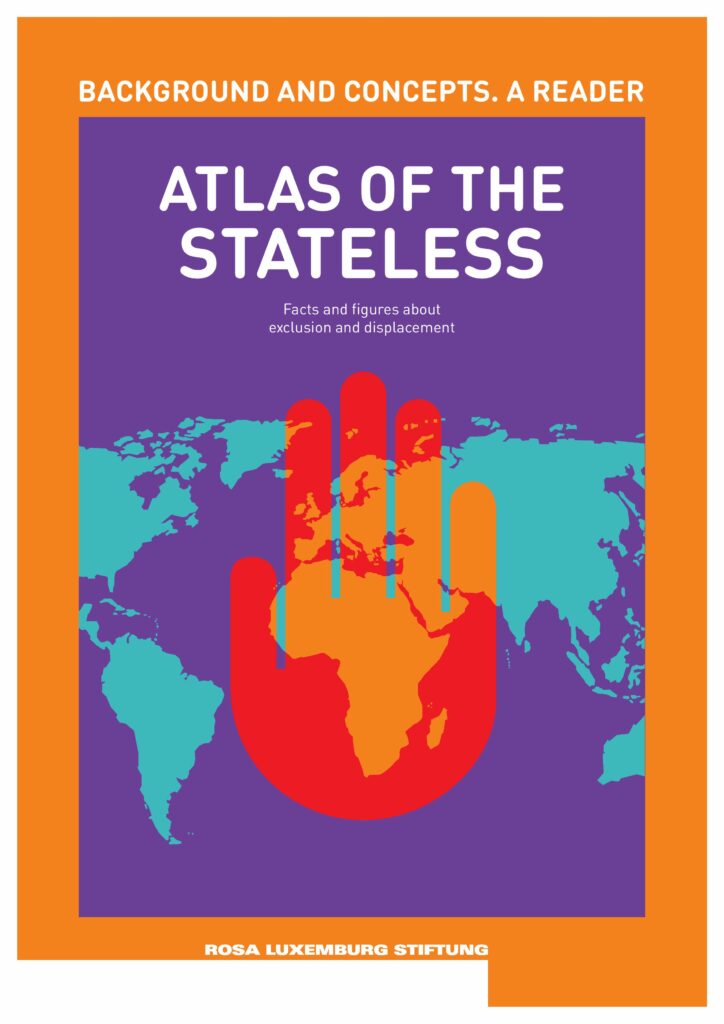Share Twitter Facebook Email Copy URL
Western culture contains strands of cold rationalism that regards relationships as business transactions, as well as inward-looking localism that places the homeland on a pedestal but views outsiders with xenophobic suspicion. These are unsuited to modern society where people from many backgrounds find themselves living as neighbours. Instead, we need an ethic that welcomes strangers.

Rachid Boutayeb is Professor of modern philosophy at the Doha Institute for Graduate Studies. His research focuses on Otherness, Relations between Islam and the West and Social Philosophy.
The article was published in the guide to the Atlas of the Stateless in English, French, and German.
We are all foreigners. Does this statement, written on the wall of a German university, address people in general – people who tend to treat foreigners with suspicion? Or is it directed at students in particular? Or simply at philosophers who dream of a better world?
The “superfluous man” of modernity, “moral panic”, and “the politics of securitization” of which Zygmunt Bauman spoke,[1] are deeply connected. But politicians on the hunt for votes, and alarmists in the media, prefer to be silent on the aetiology of this situation because they have already identified a culprit: foreigners. Today, it is mainly Muslims who are doomed to fulfill this role. The paranoia about Islam is the big lie in neo-liberalist discourse. Hannah Arendt goes so far as to say that the political lie in modernity has become “complete and definitive”.
The industry of fear is based on ideas, or rather prejudices, inherited for a large part from the Middle Ages and the Enlightenment. Despite an increase in knowledge, it continues to dominate the symbolic links between the West and Islam, as if Islam had not existed as an intrinsic element of Western culture and history since late antiquity. By pushing it away, the West merely confirms the presence of Islam, at least as something incomprehensible and foreign. But given the political instrumentalization of Islam and the rise of a bloody ideology in its name, we can and must also speak of a legitimate fear. But it is a fear that is constantly being exploited in the West and elsewhere. Instead of repudiating the instrumentalization of Islam, we content our selves with placing the blame on culture. By condemning Islam, Western modernity condemns itself.
This is why I believe that the issue perceived as “problems of integrating Muslims” is the wrong debate. While certain immigrants ghettoize themselves in the name of an illusory sense of belonging, and their misconduct attracts a disproportionate amount of media attention, the political and media discourse in countries like Germany and France fails to note that we are dealing with religiosity, not with a religion. This religiosity is linked to a condition of marginalization and rejection, even social invisibility, to quote Axel Honneth.[2]
Immanuel Kant criticized Judaism as “unfreedom”. And many modern thinkers such as Peter Sloterdijk say that it is impossible to be a Muslim as well as a citizen of a democracy. Hegelian philosophy “does not travel”, and is nevertheless driven by a fervent need to judge others. Like a child, it seeks to dominate the other, to civilize it, to bring it back to complete obedience. Cold reason, in its disregard of intercultural relationships, does not differ from this intellectualism, in which meaning (as Emmanuel Levinas has shown) is reduced to “contents given to consciousness”.[3]
I propose an alternative to the sense of belonging that assaults the other, seeks to assimilate it and thereby stay the same. Instead, I propose a “rationality of the neighbourhood”: an ethic of compassion and tolerance for ambiguity. This is a rationality knowingly articulated in the language of spontaneity, empathy and cooperation. In other words, it counters the overvaluation of cognitive, abstract thinking and works against the expansion of power and the cruel rejection of others. Its logic is not one of objective thought but of subjective gratitude – gratitude that cannot be reduced to a businesslike response to a benefit received. This is an ethical vision promoted by the great monotheistic religions [4] that has today fallen into disuse.
Nevertheless, the German idea of Heimatdenken (“homeland thinking”) is a misguided response to the social winter of reason. Heimatdenken is an irrational reaction that emanates from this very reason and reproduces its own logic of exclusion. “Homeland” implies possession, not sharing. And such thinking remains rooted in the logic of kinship, in a specific genealogical myth. Levinas rightly sees in this fetishization of place, the homeland, the destruction of those who are not (and should not be) part of it. I therefore reject, without any sense of oikophobia (dislike of one’s own home), the view that it is in relation to the oikos that we can speak of neighbourhood. In the neighbourhood, we are tied to others, which makes the neighbourhood an ontological constituent of each person. Further, the neighbourhood represents a withdrawal from oneself, a dissociation of place, since neighbours, in democratic societies, have re-placed kin; a kind of “free union”, according to Hélène L’Heuillet.[5]
But for those trapped in a nationalist paradigm, the neighbour can only be a kinsman. There is no place for what Jacques Derrida calls the “absolutely unlike”, of that face which, in the sense given by Levinas, unseats any objectifying intentionality, or of the God, friend of strangers, that Hermann Cohen spoke of. We can clearly see what form humans can assume – or lose – when Heimatdenken, the ethnocultural approach that de-fines social groups according to their origins or membership, the temptation par excellence to build walls, the political dictatorship of the brother, takes over the world. I only have one country, but it is not my own.
[1] Zygmunt Bauman, Wasted lives: Modernity and Outcasts, 2004. Cf. Bauman’s Liquid Modernity, 2000, and Liquid Fear, 2006. All three at Polity Press, Cambridge
[2] Axel Honneth, Invisibility: On the Epistemology of ‚Recognition‘, in: Aristotelian Society Supplementary Volume, v. 75, issue 1, pp.111–126, July 2001
[3] “contenus donnés à la conscience”, Emanuel Levinas, Humanisme et l’autre homme, Paris 1987, p.18
[4] Elisabeth Conradi, Forgotten Approaches to Care. The Human Being as Neighbour in the German-Jewish Tradition of the Nineteenth Century, in: Care in Healthcare, ed. Franziska Krause, Joachim Boldt, Cham 2018, pp.13–35
[5] Hélène L’Heuillet, Du voisinage, Paris 201



